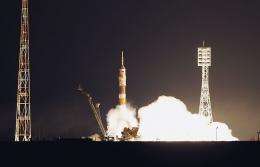Spaceship 'Gagarin' docks with ISS

A Soyuz craft carrying two Russians and an American on Thursday docked with the International Space Station, ahead of celebrations marking half a century since Yuri Gagarin's trail-blazing flight.
After a two-day journey, the TMA-21 capsule named after the first man in space docked with the ISS at 2309 GMT Wednesday as it orbited over the Andes Mountains in Chile, Russia's mission control centre and NASA said.
The mission has been dedicated to Gagarin's flight which gave the Soviet Union its greatest Cold War propaganda victory over the United States.
Their Soyuz capsule is not only named after but also inscribed with the name of the cosmonaut, in a break with tradition in a country which unlike its space rivals never gives names to its spacecraft.
Cosmonauts Alexander Samokutyaev and Andrei Borisenko and US astronaut Ronald Garan blasted off Tuesday from the main launchpad at Russia's Baikonur cosmodrome in Kazakhstan, the same location where Gagarin went on his historic space mission on April 12, 1961.
Samokutyaev and Borisenko are making their first space flight while Garan is making his second, having already flown on the US shuttle Discovery in 2008.
The mission is a centrepiece of celebrations marking the half century of manned spaceflight and there had been worries it could miss the anniversary after a technical problem forced a delay from the original March 30 lift-off date.
Russia is celebrating Gagarin's flight with flair, with some 40 heads of foreign space agencies set to participate in the upcoming events led by President Dmitry Medvedev.
Prime Minister Vladimir Putin was later Thursday scheduled to visit the town of Gagarin in western Russia to celebrate the memory of the world's first cosmounaut who was born in the village of Klushino near the town that now bears his name.
Gagarin's 108-minute mission -- which ended with him parachuting down into a rural area of central Russia -- came at the height of the Cold War, but these days spaceflight is promoted as a joint endeavour between the former foes.
"We will become that very face which will symbolize the theme of these festivities," Samokutyaev said in remarks released ahead of the mission.
His US colleague Garan said the anniversary would be an opportunity to pay tribute to international cooperation born out of the space programme.
"There is no doubt in my mind that the world is a safer and more peaceful place today than it would be otherwise if we had not taken that first step into space," he said in his last blog entry before the flight.
Garan's mother, Linda Relis, told a US newspaper last month that his paternal great-grandfather, who came to the United States from Russia, claimed they were related to Gagarin.
"He used to say that his name was altered from Gagarin to Garan at Ellis Island," Relis told The Palm Beach Post.
Russia's Soyuz craft will later this year become the sole means for taking humans to the ISS when NASA takes its shuttles out of service, leaving the United States reliant on the more rudimentary Russian technology.
At the time of Gagarin's flight, even the location of the Baikonur cosmodrome was a tightly-guarded secret and the presence of Americans anywhere near would have been unthinkable.
Samokutyaev, Borisenko and Garan will live and work in space until September. They joined on board NASA astronaut Catherine Coleman, Europe's Paolo Nespoli and Russian cosmonaut Dmitry Kondratyev.
While the anniversary of Russia's space triumph is celebrated with gusto, the country last October quietly marked the 50th anniversary of a long-classified disaster when 126 people were burned alive when a prototype rocket exploded in Baikonur.
Russia's space agency has called the tragedy the world's most horrific space catastrophe.
Soviet leader Khrushchev -- who would less than a year later kiss Gagarin upon his return from space -- imposed total secrecy over the 1960 accident.
(c) 2011 AFP




















